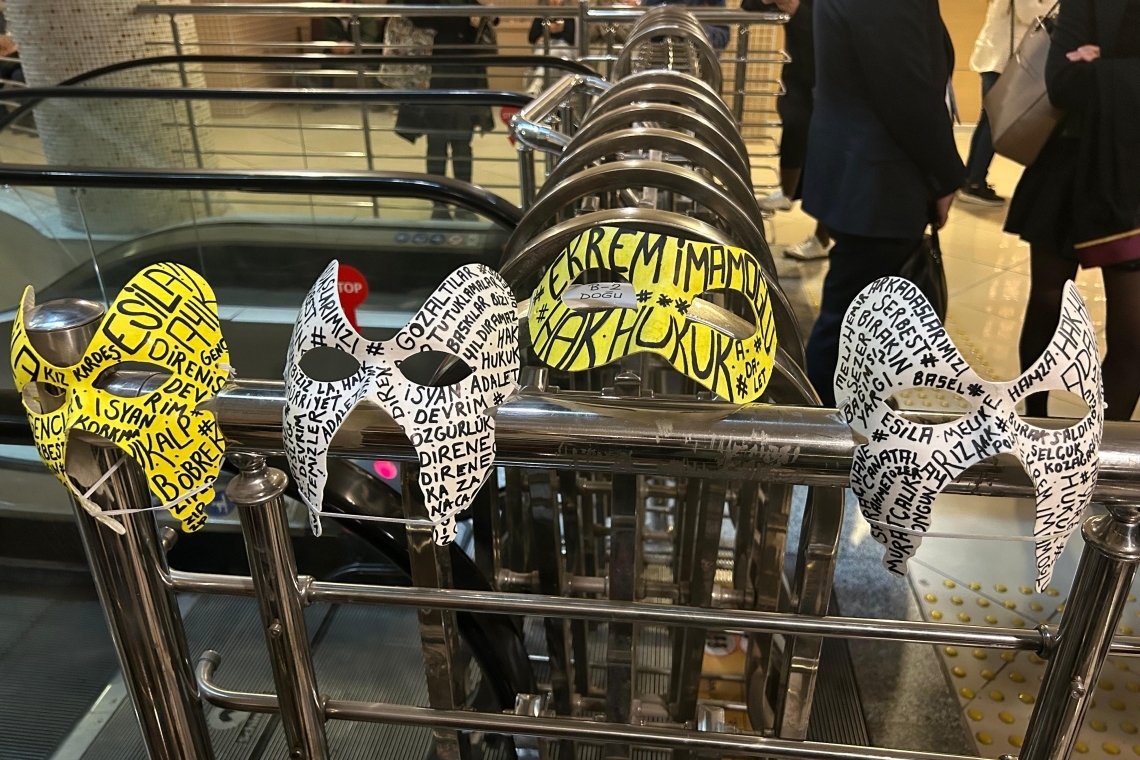PHOTO: Students who came to support their friends left masks on the barricades in front of the courtroom, where only reporters from state-run Anadolu Agency (AA) and the Anka News Agency were allowed in, and the number of lawyers permitted was also restricted.
Rabia Çetin
Three university students who were jailed after carrying a banner reading “Dictator Erdoğan” at a solidarity concert in Istanbul’s Kadıköy district have been released from pretrial detention following their first court hearing. Esila Ayık, Arda Öğüşlü and Mehmet Efe Erdoğan face charges of “publicly insulting the president” and could receive prison sentences ranging from 1 year and 2 months to 4 years and 8 months.
The first hearing of the case was held at the 77th Criminal Court of First Instance in Istanbul’s Anadolu Courthouse. The students were arrested on April 8 after attending a solidarity event at the Kadıköy Dayanışma Sahnesi, a venue known for hosting politically themed cultural gatherings. The protest at the event was held in support of students arrested during demonstrations in Istanbul’s Saraçhane district.
The court hearing began with a 2.5-hour delay and was attended by the families of the defendants, members of the “Parent Solidarity Network” formed by relatives of students detained during previous protests, senior officials from the main opposition Republican People’s Party (CHP), including Deputy Chair Suat Özçağdaş and Istanbul Provincial Chair Özgür Çelik, as well as former Istanbul Bar Association President Filiz Sara and numerous lawyers and friends of the students. A heavy police presence was observed inside the courtroom, and access was restricted for both journalists and attorneys.
Defense statements: “We didn’t know it was a crime”
In her defense statement, Esila Ayık said she attended the event not as a protester but as a photography student taking pictures. She stated, “I found a banner and held it just to have my photo taken. The person who gave it to me was wearing a mask. I held the banner for less than five minutes. I didn’t know it could be a crime. If I had known, I wouldn’t have done it.” Ayık added that due to 35 days in custody, she had missed her exams and fallen behind in school. She also cited health concerns, saying, “I have kidney and heart conditions. Prison conditions are not suitable for my health.”
Arda Öğüşlü, another defendant, said a friend gave him the banner during the concert. “We didn’t make the banner ourselves. I didn’t think the message on it might be a crime. People were taking photos, and I held it up briefly. I left soon after because the noise was bothering me, and then I was arrested,” he told the court. He described struggling with his parents’ recent divorce and ongoing mental health issues, saying he receives psychological treatment and is on medication. “Despite this, I maintain a good GPA at university. I’m studying in a program I love, and my dream is to represent my country in the future. I missed my exams and I don’t want to repeat the year,” he said.
Mehmet Efe Erdoğan, the third student, said in his defense, “I was there for the concert. In the chaos, a banner ended up in my hands. I didn’t even read it. I held it for maybe two or three minutes. Even if I had knowingly done it, it should fall under my right to freedom of expression.” He added that he studies on a full scholarship and that any drop in his academic performance could cost him both his scholarship and housing. “My family cannot afford my education. I have allergic asthma and haven’t received proper treatment in prison,” he said, ending his statement by appealing to the judge’s conscience.
Lawyers and prosecution argue over intent and expression
The defense attorney for Öğüşlü argued that the students were exercising their constitutional rights and that “a person in the president’s seat must be able to tolerate strong criticism.” Ayık’s attorney, Göksun Canberk Uluğ, said her client’s health was critical. “She was rushed to the emergency room with heart issues. She’s in a ward with 50 people sharing the same bathroom and toilet. Her kidney condition could worsen due to an untreated infection,” he said.
President Recep Tayyip Erdoğan’s lawyer, Sümeyye Nur Yaman, claimed the students’ actions had damaged Erdoğan’s honor, dignity and reputation, and that they were seeking criminal charges.
The prosecutor reiterated the demand for continued detention of the students, but after a final round of defense statements, the judge took a 15-minute recess before announcing the decision to release the students without judicial supervision. The trial was postponed until December.
Background on the case
On April 8, the three students were detained after allegedly holding a banner reading “Dictator Erdoğan” during a concert in Kadıköy organized in support of peers arrested during protests in Istanbul’s Saraçhane district. The case has drawn national attention due to its implications for freedom of expression in Turkey, a country often criticized by international human rights groups for the prosecution of individuals under broad insult laws.
The indictment against the students was swiftly prepared by the Press Crimes Bureau of the Anadolu Chief Public Prosecutor’s Office and accepted within two days. They each face charges of “publicly insulting the president,” a criminal offense under Article 299 of the Turkish Penal Code.



